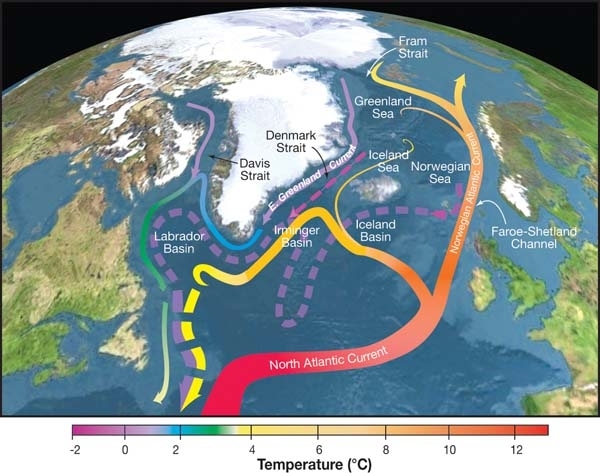
According to more than one recent study the ocean currents in the North Atlantic are in more precarious shape than was previously realized. It is now extremely likely that our climate crisis may further impair the Atlantic meridional overturning circulation (AMOC)—now at a 1,000-year low—sooner than anticipated, calling for immediate action to remedy before a vital energy transfer mechanism grinds to a halt.
Following a recent comprehension that ice sheets in Greenland are melting faster than ever before, researchers from the University of Copenhagen in Denmark incorporated this data in their ocean climate model, and found that the increased flow of fresh water into the North Atlantic sped up the timeline for a dangerous disruption of the AMOC.
The AMOC is a network of currents that flow across the North Atlantic Ocean; playing a crucial role in the world’s overall network of large bodies of water, oceans, rivers, and tributaries. Warm surface water flows through the Caribbean, northward along the Eastern Seaboard, then cuts diagonally across the Atlantic towards northern Europe. Once there, it normally cools when it mingles with waters flowing south from the Arctic, and as it cools it sinks to lower depths in the ocean where it joins a southward current that carries the water on the next leg of its journey around the world.
The increasing amount of fresh water coming from ice melting in the Arctic prevents the current from sinking when it cools; since fresh water is more buoyant than salt water. The water from the north impedes the current’s ability to sink to lower depths, despite being cooler in temperature. In the short term, this not only slows the southward flow of ocean currents, but also causes warm water from the Caribbean to back up along the Eastern Seaboard, causing disproportionate sea level rise, and fueling the intensity of hurricanes.
“It is worrying news,” says researcher Johannes Lohmann, regarding the advancing deadline for a potential reorganization of the AMOC. “Because if this is true, it reduces our safe operating space.”
This news comes at a time when the flow of the AMOC is at a 1,000-year low, according to a separate study published in Nature Geosciences. This slowdown is part of a long-term trend that started in the mid-nineteenth century, and was sharply worsened in the mid-twentieth century when it became more apparent how human-generated effects had long since begun to cause drastic global climate change.
Over the past 150 years the AMOC’s flow has decreased by 15%, but there may also be a tipping point where the current is disrupted enough to throw it entirely off course, a scenario that would be catastrophic for our home planet’s climate.
“The AMOC has a profound influence on global climate…so this evidence of an ongoing weakening of the circulation is critical new evidence for the interpretation of future projections of regional and global climate,” begins Andrew Meijers, deputy science leader of polar oceans at the British Antarctic Survey. “The AMOC is frequently modeled as having a tipping point below some circulation strength, a point at which the relatively stable overturning circulation becomes unstable or even collapses. The ongoing weakening of the overturning means we risk finding that point, which would have profound and likely irreversible impacts on the climate.”
“If we continue to drive global warming, the Gulf Stream System will weaken further, by 34 to 45 percent by 2100; according to the latest generation of climate models,” explains study co-author Stefan Rahmstorf, an oceanographer with the Potsdam Institute for Climate Impact Research in Germany. “This could bring us dangerously close to the tipping point at which the flow becomes unstable.”
As we see more and more evidence of a coming climate crisis, it is important that we remember to strive to take better care of this planet, our home.
Subscribers, to watch the subscriber version of the video, first log in then click on Dreamland Subscriber-Only Video Podcast link.
1 Comment